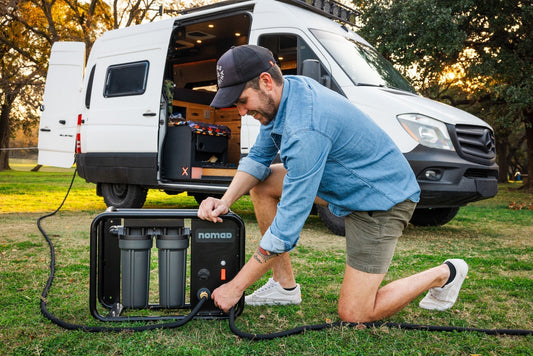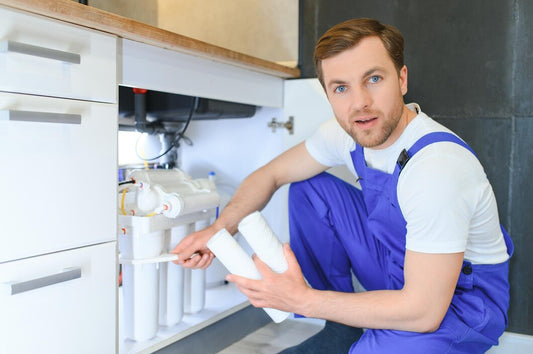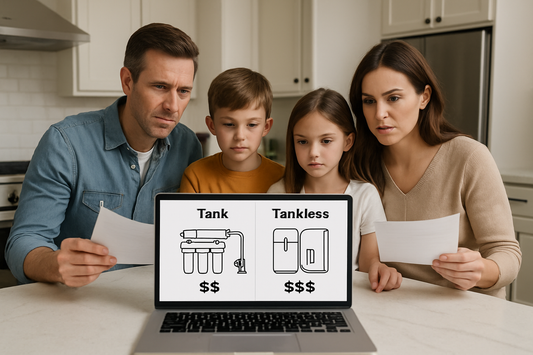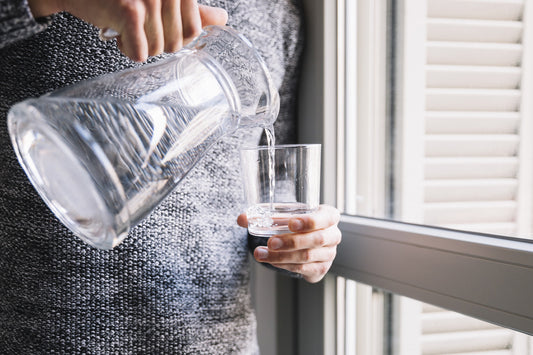You're scrubbing white spots off your shower door again, wondering why your "softening" shampoo isn't working, and your coffee still tastes like a swimming pool. Sound familiar?
Here's the truth most homeowners don't realize: Your water problems aren't just annoying—they're expensive. Hard water destroys appliances 40% faster, while contaminated water means you're buying bottled water by the case.
The good news? The right water treatment system fixes these issues permanently. But here's where most people get confused: water softener vs water filter isn't an either-or decision until you understand what's actually wrong with your water.
Quick Problem Diagnosis: What's Really Going On?
You Need a Water Softener If:
- White, chalky buildup appears on faucets and showerheads
- Soap doesn't lather well (you use twice as much)
- Dishes come out of the dishwasher spotted and filmy
- Your skin feels dry and itchy after showers
- Appliances like water heaters fail prematurely
You Need a Water Filter If:
- Water tastes like chlorine or chemicals
- Sediment or particles float in your glass
- Water looks cloudy, yellow, or discolored
- Strange odors come from your tap
- You're concerned about contaminants like lead or bacteria
You Might Need Both If: Your water has multiple issues—common in rural areas or older municipal systems.
Water Softeners: The Scale-Fighting Solution
Water softeners tackle one specific enemy: mineral buildup from calcium and magnesium. These systems use ion exchange technology, swapping hard minerals for sodium ions.
How Softeners Save You Money
Appliance Protection: A quality softener extends water heater life by 3-5 years and prevents costly scale damage in dishwashers and washing machines.
Soap Efficiency: You'll use 50% less soap, shampoo, and detergent once minerals stop interfering with cleaning products.
Maintenance Reduction: No more scrubbing mineral deposits or replacing clogged shower heads every few months.
The Reality of Softener Ownership
Monthly Salt Costs: Budget $8-15 for salt, depending on your water hardness and household size.
Space Requirements: Most whole house systems need a 2x4 foot area near your main water line.
Regeneration Cycles: Modern systems regenerate automatically, typically using 25-50 gallons during the cleaning process.

Image by nomadsoul1
Water Filters: The Contaminant Elimination Team
While softeners focus on minerals, whole house water treatment systems using filtration technology target everything else: chlorine, sediment, chemicals, and potential health hazards.
Types of Filtration That Actually Work
Sediment Filters: Remove visible particles, rust, and debris (replace every 3-6 months)
Carbon Filters: Eliminate chlorine taste, chemical odors, and many organic compounds (replace every 6-12 months)
Multi-Stage Systems: Combine several filter types for comprehensive treatment
Real-World Filter Performance
Quality filters improve water taste immediately—no more buying bottled water or avoiding tap water. They also protect your plumbing from sediment damage and reduce chlorine's drying effects on skin and hair.

System Showdown: Top Water Treatment Options
Crystal Quest Whole House Water Filter System
This comprehensive whole house water filter handles multiple contaminants without the complexity of softening systems.
Performance Specs:
- Removes chlorine, sediment, and chemical tastes
- 15-20 GPM flow rate maintains good pressure
- 100,000-gallon capacity serves families of 4-6
- Easy filter changes with pressure release valve
Best For: Homes with good mineral balance but taste, odor, or sediment issues.
Salt-Based Water Softener Systems
Traditional ion exchange softeners remain the gold standard for hard water treatment in homes testing above 10 grains per gallon hardness.
Key Advantages:
- Proven technology with decades of reliability
- Complete mineral removal prevents all scale buildup
- Available in various capacities for different household sizes
- Professional installation ensures optimal performance
Ideal Applications: Areas with very hard water where scale prevention is the primary concern.
Combination Water Treatment Systems
Dual-purpose systems handle both water softener and water filter functions, though they're more complex and expensive than single-purpose units.
When They Make Sense:
- Severe hard water plus significant contaminant issues
- Limited space for multiple systems
- Budget allows for comprehensive treatment upfront
Making the Right Choice: A Step-by-Step Decision
Step 1: Test Your Water
Get a professional water test or use a reliable home test kit. You need specific numbers for hardness (grains per gallon) and contaminant identification.
Step 2: Calculate Your Priorities
Budget Consideration: Basic filters cost $200-500 installed, while quality softeners run $800-1,500 including installation.
Maintenance Preference: Filters require regular replacements but no ongoing consumables. Softeners need monthly salt but less frequent major maintenance.
Space Constraints: Measure your available area—combination systems save space but cost more upfront.
Step 3: Consider Your Water Usage
Large families (4+ people) benefit more from high-capacity systems, while smaller households can use more economical options.

Image by thomsond
Frequently Asked Questions
Can I install a water softener and filter together? Yes, many homeowners use both systems in sequence. Install the sediment filter first to protect the softener, followed by the softener, then a carbon filter for taste improvement.
How often do water filters need replacement? Sediment filters typically last 3-6 months, carbon filters 6-12 months, and whole house systems need annual service. Usage and water quality affect replacement frequency.
Do water softeners remove chlorine and other chemicals? No, traditional salt-based softeners only remove hardness minerals. You need carbon filtration or a combination system to address chlorine, chemicals, and taste issues.
Which system provides better drinking water? Water filters improve taste and remove potential contaminants, making them better for drinking water quality. Softeners improve cleaning and protect appliances but don't enhance taste.
The Bottom Line: Choose Based on Your Actual Problems
Don't let sales pitches confuse you—the best whole house water treatment systems solve your specific water problems efficiently and affordably.
If hard water is destroying your appliances and making cleaning difficult, invest in a quality water softener. You'll see immediate improvements in soap performance and long-term savings in appliance repairs.
If your water tastes bad or you're concerned about contaminants, start with a comprehensive filtration system. Your family will drink more water, and you'll stop buying bottled water.
For comprehensive water improvement, consider our water treatment system collection to find systems that address multiple issues simultaneously.
Remember: The right water treatment system pays for itself through appliance protection, reduced cleaning product use, and elimination of bottled water purchases. Choose based on your water test results, not marketing promises.





